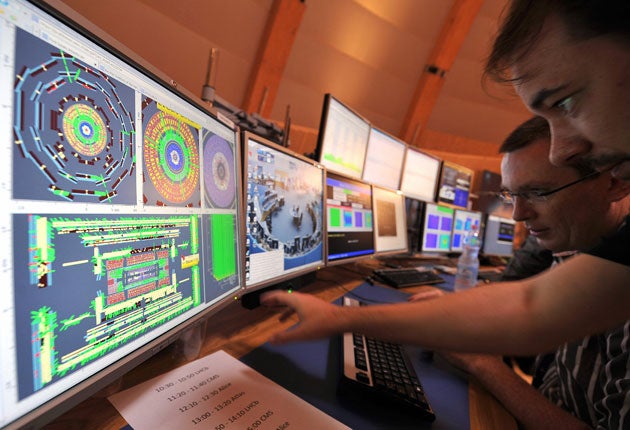Breakthrough hailed in quest for 'God particle'

Your support helps us to tell the story
From reproductive rights to climate change to Big Tech, The Independent is on the ground when the story is developing. Whether it's investigating the financials of Elon Musk's pro-Trump PAC or producing our latest documentary, 'The A Word', which shines a light on the American women fighting for reproductive rights, we know how important it is to parse out the facts from the messaging.
At such a critical moment in US history, we need reporters on the ground. Your donation allows us to keep sending journalists to speak to both sides of the story.
The Independent is trusted by Americans across the entire political spectrum. And unlike many other quality news outlets, we choose not to lock Americans out of our reporting and analysis with paywalls. We believe quality journalism should be available to everyone, paid for by those who can afford it.
Your support makes all the difference.You wait millions of years for a God particle to come along, and then two clusters turn up at once.
Scientists in the US announced they may have detected the elusive and potentially universe-changing Higgs boson particle yesterday, just two days after rivals in Switzerland signalled that they, too, have caught their first sight of it.
The physicists working at the Fermilab facility in Illinois may not be as well known as their more illustrious competitors at the Cern Institute near Geneva, which attracted widespread media attention and predictions of an apocalypse when its Large Hadron Collider was turned on in 2008.
However, Fermilab have their own version of the $10 billion collider, known as the Tevatron, in which they are also accelerating beams of protons and antiprotons around tunnels many miles long at extreme speeds. Both teams are doing this to create high-energy collisions between the particles, which they believe should produce the mysterious Higgs boson.
This puzzling sub-atomic object is the key missing element in the Standard Model theory of particle physics, hence its "God particle" nickname.
If its existence can be proven, it will confirm our understanding of why some elements of our universe have a mass, while others, such as light, do not. And the problem, scientists believe, is not so much in creating the boson but in observing it.
It was on Friday that the team working on the Cern project said they had finally detected the first "bumps" in data collected from their particle collisions, and that was followed yesterday by similar, though not quite as strong, results released from the Fermilab team.
However, while there was excitement at the announcements at the Europhysics conference in Grenoble, south-eastern France, it could be as long as a month before the results can be verified. For now, the researchers are saying their findings are merely "hints", and what they think are signs of the Higgs boson could yet be eliminated during the filtering of the data.
But coming together in such a short space of time and offering similar forms of data, the work of these two labs appears to offer reassurance that the Standard Model is correct – and that the billions of dollars invested in the programmes have been well spent. The Fermilab team will doubtless feel especially pleased as the Large Hadron Collider has made their Tevatron obsolete, and it is set to close in September.
Someone else likely to feel he is on the road to final vindication is Professor Peter Higgs, the theoretical particle physicist after whom the particle is named. Now in his eighties, Higgs first proposed its existence more than 40 years ago when he was a young theoretical physicist at the University of Edinburgh. Almost nobody took him seriously then, with even the Cern-based editor of a leading physics journal thinking it was too doubtful to be published. How times have changed.
Join our commenting forum
Join thought-provoking conversations, follow other Independent readers and see their replies
Comments